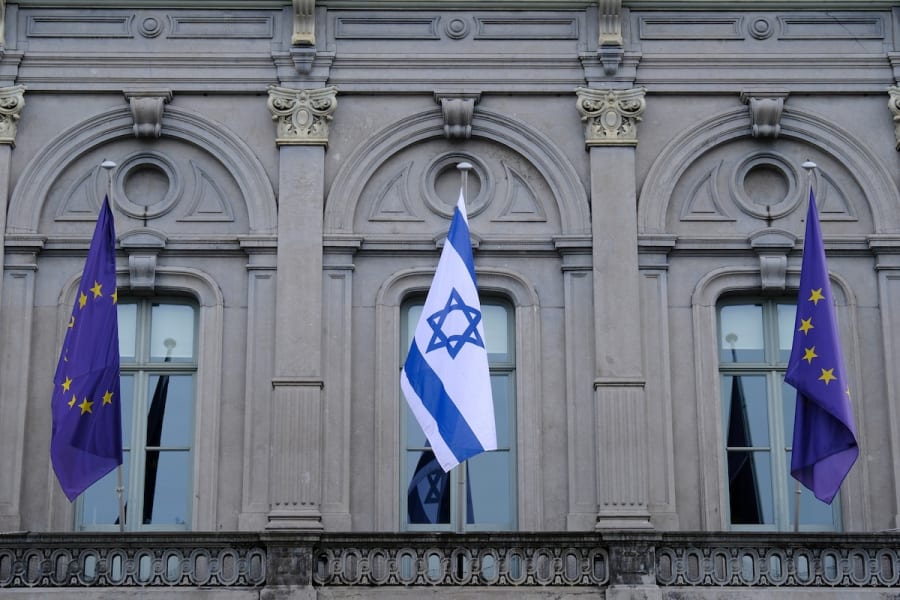A rundown of EU Parliament election results and how it could affect Israel

The elections to the European Union Parliament have ended, and what we see in the preliminary results is a stronger conservative block, more immigration skepticism, a weakened socialism and an epic crash for environmentalism. How will this shape the coming five years, the EU’s relationship with Israel, and the war in Ukraine? Let’s break it down.
There is never a clear “winner” in a European Parliament election, since no group ever holds a majority of the seats, and they always need to compromise with one another. But since the conservative group EPP continues to be the largest group, with over 25% of the seats, we can expect the conservative president of the EU Commission, Ursula von der Leyen, to get the confidence of the parliament for another five-year term, as long as the EPP can convince their coalition partners to support her. Should she succeed, she has until November to appoint her cabinet.
The three largest groups, EPP, S&D and Renew (Conservatives, Socialists, and Liberals) still retain control of the parliament with a 55% majority. It’s less than the 59% they had before, but nevertheless a majority, so there’s no earth-shattering change. However, it’s a clear sign that the far right has grown stronger with more and more Europeans wary of unchecked immigration, pro-terrorists chanting in their streets and higher crime rates.
The leftist parties are now rightly worried that the EPP will turn to the far-right parties rather than cooperate in the political center. This will likely happen on certain issues, but perhaps not on everything. We will probably see more immigration skepticism, stronger tools against organized crime, and maybe more nuclear energy and less environmental legislation. We can also expect to see stronger condemnations against Hamas, harsher measures against Iran, and more support for Israel. It won’t be a huge change overnight, but we can see how the needle is slowly moving in that direction. As for Ukraine – there are a number of pro-Putin parties, but they are on the fringes in the extreme right and the extreme left, so Ukraine is expected to continue receiving the full support of the EU.
These elections have also been seen as a referendum on how people view their existing government. In France, President Emmanuel Macron saw how his Liberal party received just 15% of the votes, behind Marine Le Pen’s 30% and dissolved his parliament calling for snap elections.
German Chancellor Olaf Scholz, similarly, saw how his Socialist party fell to 14% behind the Nationalist extremist party AfD, with 16%, and how his own coalition didn’t even gain a third of the votes in Germany.
In Belgium, Prime Minister Alexander De Croo resigned after his Liberal party was defeated. De Croo was vocal in his criticism of Israel and even went to Egypt in November 2023 to give a speech at the Rafah crossing calling for a permanent ceasefire at the worst timing ever – moments before the first group of women and children made their way through en route to Israel. In Spain, the anti-Israeli socialist prime minister lost to the right-wing opposition and only gained 20 of the 61 seats in parliament, while his opponent took 22.
The far-right has gained a lot, but it’s so far just a trend, not an earthquake. We also need to keep in mind that the far right is split into two groups since they can’t unify under one policy, which weakens them. In addition, there are a number of far-right parties that are non-affiliated because they have been relegated from their groups, most notably AfD from Germany and Fidesz, the ruling party in Hungary.
The two far-right groups will control 131 seats together. Together with other nationalist parties, you could count another 34 or so – that’s almost 23% of the parliament, and would be the second largest group if they were organized. But after an AfD candidate spoke in favor of Nazis, and the controversy around Hungarian Prime Minister Viktor Orban, it’s hard to see how that would happen.
Let’s quickly go through the different groups of the parliament, one by one:
EPP – the Conservatives
This is the largest mainstream conservative group, and gained 10 seats in the election. They now have 186 out of 720 seats which is over 25%. They include political parties in all 27 EU countries, including the ruling party in 11 EU countries, like Poland, Portugal, Ireland, Sweden, Finland, and Austria. Hungary’s ruling party Fidesz, under Orban, used to be a part of the EPP but was relegated in 2019 and is now a non-affiliated party.
S&D – the Socialists
This is the second-largest group and the largest left-leaning socialist democracy party block. They have 135 seats out of 720 – which is a bit less than 20% – and lost four seats in this election. They include political parties in 26 EU countries, including the ruling party in four EU countries, like Germany and Spain. Scholz in Germany is under a lot of pressure after his party only gained 14% of the German votes, behind the emerging extremist right-wing party AfD with 16.5% – more about them under “non-affiliated.”
Renew – the Liberals
This is the third largest group with 79 seats and they’ve taken a big crash. They lost 23 seats in this election, going down to less than 11% after having been at over 14%. They see themselves as centrist, neither left nor right, and are comprised of political parties from 24 EU countries, including the ruling party in five EU countries, like the Netherlands, France and Belgium. Their defeat in these elections has caused a political crisis in France.
ECR – the Populist Far-Right
This is the fourth largest group with 73 seats, after gaining four seats in the recent elections. Not quite enough to surpass the Renew group, but almost. They include 17 political parties from 15 EU countries, including the ruling party in two EU countries – Czechia and Italy, most notably Italian Prime Minister Giorgia Meloni, whose party gained 25% of the votes in Italy. The group is strongly anti-immigration, and Eurosceptic, meaning they wish to limit the power of the EU over individual states. They include political parties that have been accused of fascism but are generally pro-West, pro-Ukraine, and pro-USA – and even if they want to limit the EU’s power, they don’t advocate for leaving the EU.
ID – the Even Further Right
With 58 seats total, the ID gained nine seats in the latest election. They only include seven parties from 10 EU countries, most notably Le-Pen’s “National Front” in France and Geert Wilders' “Party for Freedom” in the Netherlands. National Front received 31% of the French votes, making it the largest French political party in the EU Parliament, and is double the size of President Macron’s party, causing him to announce a snap election. This group is more nationalist and anti-West, and even includes members who have been in favor of “dialogue with Putin” but the group, as a whole, supports Ukraine. None of the parties are a ruling party in any country. A Finnish party recently left ID and joined the ECR instead, because they had changed their view on NATO. The fact that the far-right can’t unite into one larger group weakens them, as they would otherwise be almost as large as the socialist group. But I suppose nationalism is a hard thing to rally around when you’re from different countries.
The Greens – the Environmentalist parties
The Greens absolutely crashed in this election, losing 18 seats and ending up with only 53. It used to be the fourth largest group. It has 27 parties from 15 member states. None of the parties are a ruling party in any country. They are focused on climate change and environmentalism, and are generally seen as favoring more left-leaning policies.
The Non-Affiliated parties
Parties that fail to cooperate with parties from other countries end up in this category, and they rarely have a lot in common. There appear to be 45 seats for these parties after the election, which is 17 less than before. This group includes many parties that were kicked out of their groups, such as Hungary’s Fidesz party led by Prime Minister Orban (after the elections, they might seek to join ECR or ID), a Slovakian socialist party that expressed sympathy for Putin, a Latvian pro-Russian party, the Communist party in Greece, Bulgaria’s pro-Kremlin revival party, and, of course, the hyper-nationalist German party AfD, which was kicked out from ID after their candidate made remarks about how “not all members of the Waffen-SS should be seen as criminals.”
The Left
With only 36 seats, this group seems to have lost one seat in the elections. They are typically significantly more on the political left than the socialists, favoring more state control and welfare programs, and skeptical of the capitalist system. They include many parties that used to call themselves communists before the fall of the Iron Curtain. They will often be Eurosceptic, which is something they have in common with the far-right groups, and a few members are sympathetic to Putin. They include 19 parties from 13 countries.
The “Others”
This represents another 55 seats and falls in a category that includes newly-elected members not allied to any of the political groups set up in the outgoing EU Parliament. This includes Poland’s Confederation Party, which has been blatantly antisemitic and may try to join ID or ECR, but it’s unlikely they’ll be accepted.
Let’s take a look at possible coalitions:
The nightmare of the Socialists and left is that the EPP will form a majority together with all the far-right groups. But the EPP + ECR + ID + the pariahs in the non-affiliated groups would still only reach a total of 351 members, and you need 360 for a majority, so this could only be done if they can convince Renew to join the initiative.
The opposite is also true – the far-left, the greens, the socialists, and the liberals together reach only 303 members. They might be able to add a few more from others or non-affiliated leftist groups, but they won’t reach 360.
Most likely is the slight majority of the three biggest groups; S&D, Renew and EPP – socialists, liberals, and conservatives – will continue to cooperate, using the 55% majority they have over the parliament to pass appointments, decisions, and legislation for the next few years with their 400 seats.
It’s notable, however, that the EPP and Renew could potentially dismiss the socialists and bring in the two right-wing groups instead. Having that alternative as an option is bound to create some interesting dynamics. The S&D might be more willing to listen to initiatives about immigration limitations and support of Israel if it is aware the EPP has other options.

Tuvia is a Jewish history nerd who lives in Jerusalem and believes in Jesus. He writes articles and stories about Jewish and Christian history. His website is www.tuviapollack.com
You might also like to read this:














